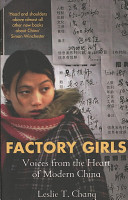I
started this book before Christmas and just recently finished it. It
is one of those nonfiction reads that you can, and must for mental
health reasons, put down for a few days before picking it up again.
No worries about losing your place or forgetting what you read
because you will be brooding about it the whole time you are not
reading.
Chang
is herself of Chinese descent. She notes that being obviously of
Chinese heritage helped open doors for her during her research that
many before her had difficulty obtaining. She actually lived among
the factory girls and scoured the cities herself interviewing the
workers for her data gathering. Interspersed with the research are
stories of Chang's own family exodus from China and the country's
history also. Chang's own grandfather had emigrated to the USA to go
to college, returned to China to help his country progress, was
murdered and eventually became a hero to his descendents. All of this
is woven into a very understandable and engrossing book. This book is
well constructed, interesting, and well documented. I would like to
find a group reading this for discussion as my book is full of sticky
notes!
According
to Chang since China is still a male-dominated culture, rural
families still strive to have male children. They will and often do
have many female children in pursuit of an heir. The males inherit
all the property and assets and usually are the only children sent
for further education after elementary school. In the 1990s the
surplus female children began to flood the cities for work in the
American factories. These girls may be anywhere from 12 to 15 when
they arrive and will stay usually only until they are in their early
30s when they will feel pressured to marry and move back to the rural
areas. If they can and are smart enough some will save wages to
educate themselves further. Those who can educate themselves will
become professionals, factory bosses, or they will emigrate.
The
factory girls live in dormitories in the factory compounds. They have
little, their relationships are superficial, and they are transient.
Some will transfer to better jobs, some will tire and go home, and
some will meet men and start homes. Many simply disappear into lives
of prostitution or are killed and no one knows where they went. Chang
delivers her material in a very matter of fact way so that you know
the problem is complex. It is not as simple as - The Unites States
puts a bunch of factories here and slaves work in them. It is true
U.S. investors put factories in China and girls will make the
products for very little per day. However, there are still millions
of young people in China who need jobs. Families in China are still
having too many children in the quest for males. Americans still want
cheap goods. Americans will not make these goods as cheaply as
Chinese workers will.
Chang's
book lets you get to know some of these workers. She lived with them,
went home to the farms with them, listened to and documented their
hopes and dreams. There are other books on the market now that will
give you a picture of the upwardly mobile, educated, and wealthy of
China but this one is a look at the rural people who have seen, in
only twenty years, the focus of their country turn from agriculture
to industry and technology. The new generation of floating population
is creating new classes of its own. Height is very important in this
new generation that is just barely free from starvation. Each factory
practices its own version of class discrimination too. If you read
this book you will be entranced with the worker's stories. It isn't
dark, or somber but it isn't sugar-coated either.

China is overflowing with disturbing undercurrents. Factory workers, rich/poor disparity, rampant pollution, food scandals, racial discrimination, government corruption, unnerving nationalism, questionable education practices, etc... We get so excited about this country and it's potential on the world scale but few realize the scale of the domestic problems it faces (and subsequently ignores).
ReplyDeleteThanks Ryan. I appreciate your input. Will we ever figure out what our proper and responsible involvement with China should be? This is a very good book.
ReplyDelete